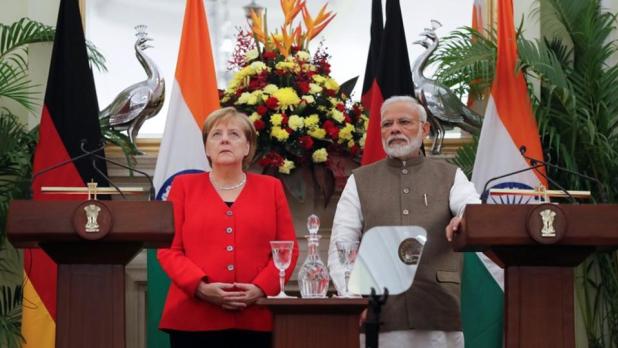Despite international murmurs, India in no hurry on Kashmir

Expressing concern about the situation in the Kashmir Valley Angela Merkel said that the situation was “not sustainable and good”
India’s tryst with ‘influencing’ international opinion on Kashmir continues unabated. After the visit of 27 Members of Europe Parliament (MEPs), reportedly of Right Wing persuasion, came the visit of German chancellor Angela Merkel, last week.
While Merkel, usually regarded as one of the few prominent European leaders not to pull punches kept her counsel in her bilateral meeting with Prime Minister Narendra Modi, her interaction with the travelling German media contingent was something else.
Expressing concern about the situation in the Kashmir Valley and its implications on the people, she told the scribes that the situation was “not sustainable and good”, adding that the ground situation in the Kashmir Valley “needs to change for sure.”
According to a Reuters’ report quoted in the Indian media, Merkel said she would raise the matter with Modi, but it remains unclear whether she did so in her bilateral meeting. For good measure, the German chancellor added that while she was aware of India’s position regarding Kashmir, parts of which are claimed by Pakistan, she wanted to hear the Indian Prime Minister’s plans for restoring calm in the region.
Merkel’s visit also assumes significance because she is the first foreign leader to visit India after Jammu and Kashmir was officially bifurcated into two Union Territories on October 31.
While much credit needs to be given to Indian foreign minister Subrahmanyam Jaishankar, a former top diplomat, for managing to keep a lid on Kashmir, using all the tact and diplomacy at his disposal to ensure that global opinion does not turn hostile, it is clear that New Delhi will have to take steps, sooner than later, to lift curbs in the Kashmir Valley.
Merkel’s comments come amidst concerns expressed by foreign lawmakers, including some leading Democrats from the United States, over restrictions imposed by the government after the abrogation of Article 370.
Seeking that foreign journalists and Congressmen be allowed free access to Kashmir, six American lawmakers have written to Indian ambassador to the US Harsh Vardhan Shringla, claiming that the picture portrayed by India in the Valley is different from the one being told to them by their constituents.
The lawmakers’ letter to Shringla comes as the US has sought from India a ‘roadmap’ to restore political and economic normalcy in Kashmir, as well as the immediate release of all political detainees.
Noting that journalists have extensively covered developments in Kashmir, acting assistant secretary of state for South and Central Asia Alice G Wells had said the role of some international reporters had been particularly important, but that journalists continued to face challenges of access while reporting due to the security restrictions.
Last week, India released the maps of newly-created Union Territories (UTs) of Jammu and Kashmir and Ladakh and the map of India depicting these UTs.
The ministry of home affairs said the UT of Ladakh consists of two districts of Kargil and Leh while the rest of the state of Jammu and Kashmir is in the UT of Jammu and Kashmir.
In 1947, the erstwhile state of Jammu and Kashmir had 14 districts, including Mirpur, Muzaffarabad and Gilgit, which lie in Pakistan-occupied Kashmir (PoK). By 2019, the then government of Jammu and Kashmir had reorganised the areas of these 14 districts into 28 districts. Pakistan, as can be expected, rejected the formulation as ‘untenable’.
But if the latest reports emanating from Kashmir are any indication, then the Indian government has no plans to release political detainees anytime soon. The UT government is looking to shift 34 political prisoners from the Centaur Hotel in Srinagar to some other locations as it lacks adequate heating arrangements.
The winter chill has started to take its toll on the health of the detainees and their security detail. The Centaur Hotel, owned by the Indian Tourism Development Corporation (ITDC), is one of the important landmarks in the city. However, there appears to be some rift between the administration and the hotel management on the bills that have been run up in hosting the detainees since August 5, 2019, after Jammu and Kashmir’s special status was abrogated.
Since the reported discord, officials are seeking other locations to shift those held, giving ample indication that despite the murmurs of discontent in global political circles, New Delhi would decide and pursue its own line of thought and action on Kashmir.









